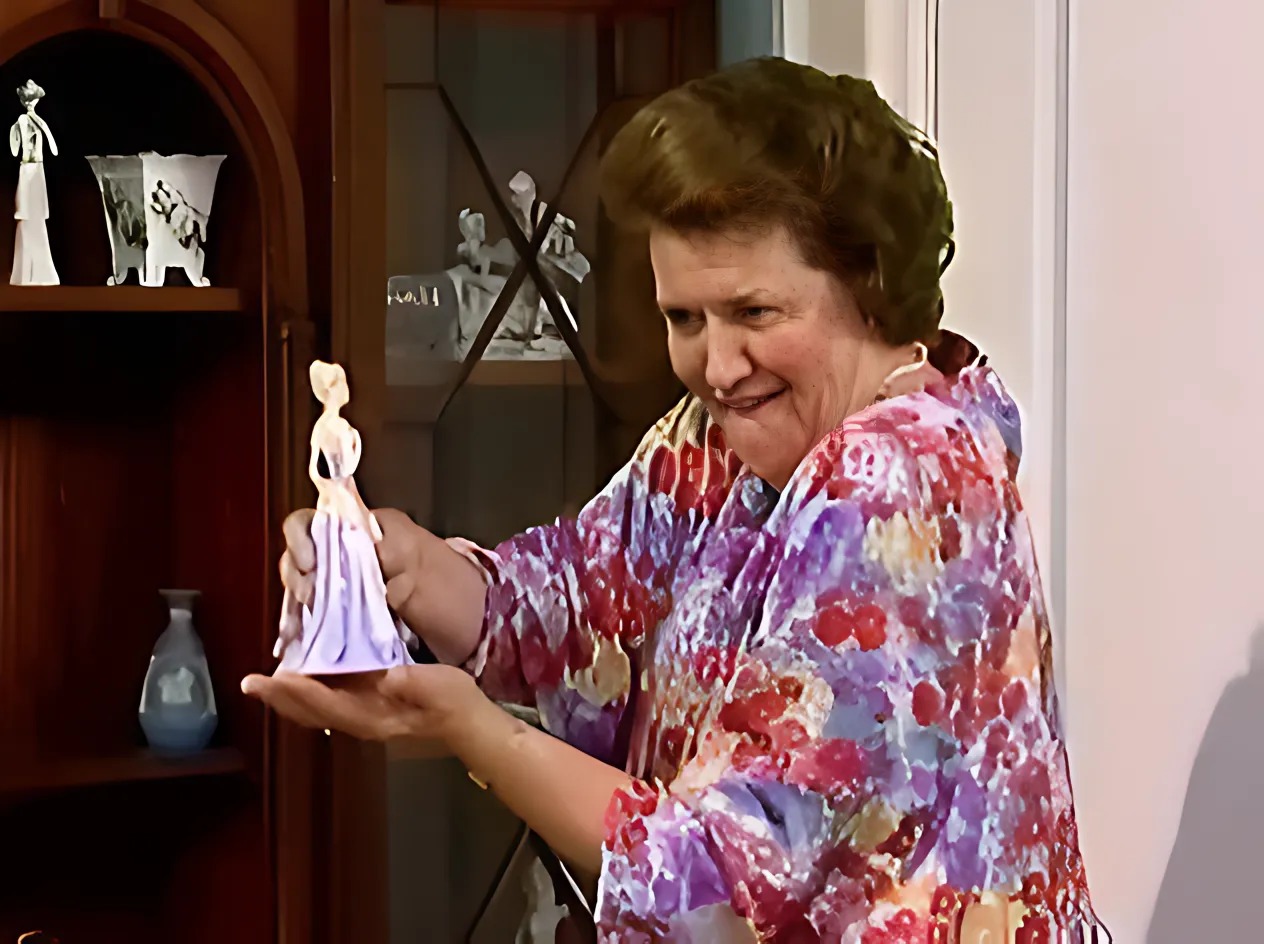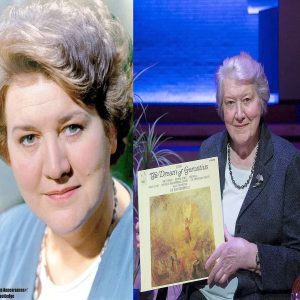EXCLUSIVE: The Secret Life of Hyacinth Bucket – And the Mysterious Origins of That Slimline Telephone
For more than three decades, Hyacinth Bucket—pronounced “Bouquet,” if you please—has stood as one of the most delightfully delusional figures in British television history. From her “candlelight suppers” to her infamous “white slimline telephone with automatic redial,” Hyacinth became a beacon of middle-class aspiration, her every move powered by social climbing bravado and a deep-seated desire to escape the ordinariness of suburban life.
But what if behind that carefully curated façade of floral arrangements and Royal Doulton with the hand-painted periwinkles, there lay a secret—one that could explain just how she afforded that telephone, and perhaps much more?
Welcome to the most thrilling and utterly unnecessary mystery in British sitcom history: the financial secrets of Hyacinth Bucket.
Behind the Net Curtains: Life on Blossom Avenue
Keeping Up Appearances, which aired from 1990 to 1995, was never just a sitcom. It was an exquisitely performed social satire, crafted with such surgical precision by creator Roy Clarke that it became a mirror for Britain’s class obsessions. At its heart was Hyacinth—played with glorious theatrical flair by Dame Patricia Routledge—whose relentless quest for respectability regularly left chaos in her wake.
Each episode offered a new social faux pas, a fresh humiliation narrowly avoided, or a grand delusion taken to comic heights. And through it all, Hyacinth remained committed to maintaining the illusion of upper-middle-class grandeur—even as her sister Daisy and brother-in-law Onslow continued to represent the working-class reality she tried desperately to disown.

One of the most iconic elements of this illusion? That pristine, white, slimline telephone with automatic redial—a status symbol that lived prominently on her hallway table, through which she conducted all her social planning and gentle bullying of the local vicar’s wife.
But where, viewers always wondered, did she get the money?
Slimline Schemes and Telephone Dreams
For years, fans have speculated over Hyacinth’s seemingly unlimited supply of funds for what she referred to as “essential lifestyle accessories.” The show made it abundantly clear that Richard, her long-suffering husband, worked in local government. And while civil servants are indeed noble, their paycheques are rarely equipped to sustain the extravagant lifestyle Hyacinth so desperately tried to project.
So when Hyacinth proudly boasted about her new white slimline telephone with automatic redial (something quite cutting-edge in 1990), the question was no longer how, but how dare she?
Was there a side hustle? A family inheritance she never mentioned? Or—more tantalizing still—was Hyacinth perhaps cannier than anyone ever gave her credit for?
A recently uncovered, tongue-in-cheek BBC behind-the-scenes memo suggests an intriguing theory: Hyacinth might have been moonlighting. Not as a socialite, but as a catalogue saleswoman—perhaps for Avon or Tupperware. Suddenly, it all makes sense. Her knack for doorstep diplomacy, her pushy but polite demeanor, and that endless energy for climbing the social ladder—what better training ground than direct sales?
Patricia Routledge: Crafting a Legend
What makes this theory so engaging is the genius of Patricia Routledge herself. A classically trained actress, Routledge imbued Hyacinth with layers well beyond the script. With her background in Shakespeare and musical theatre, Routledge brought a kind of operatic absurdity to Hyacinth—transforming her from a mere busybody into a woman at war with her reality.
Routledge’s performance earned two BAFTA nominations and turned Hyacinth into a global icon. The character resonated far beyond Britain, with Keeping Up Appearances becoming one of the most exported BBC comedies of all time, airing in more than 60 countries.
Dame Patricia often spoke in interviews about how audiences laughed at Hyacinth but also recognized her pain—the desperate, vulnerable longing to be more than one’s station in life would allow. That contradiction, Routledge believed, was what made Hyacinth timeless.
And yet, for all her posturing, there was something refreshingly grounded about the world Hyacinth inhabited—a world where a slimline phone was the ultimate luxury.
A Cultural Touchstone, Redialed
In today’s era of influencers, social media filters, and curated identities, Hyacinth’s antics feel oddly prophetic. Her attempts to broadcast the image of a perfect life, even while her real life crumbled in comic fashion, mirrors the curated Instagram realities we see today.
“Keeping Up Appearances,” then, was not just a sitcom—it was a warning wrapped in hydrangeas and served with bone china tea. And that phone? It wasn’t just a prop. It was a symbol of 1990s aspiration, consumer culture, and a woman’s defiance in the face of mediocrity.
The Final Ring
The series ended in 1995, but Hyacinth’s influence never waned. In 2016, a prequel titled Young Hyacinth was aired on the BBC, offering a glimpse into her formative years and teasing out the early signs of her obsession with class mobility.
Patricia Routledge, now 95 and having retired from acting, remains fiercely proud of the character she made legendary. In her rare interviews, she speaks of Hyacinth with a mixture of affection and bewilderment at her enduring popularity. Perhaps it’s because, for all her faults, Hyacinth represented something deeply human: the desire to be more, to be seen, to matter.
So, How Did She Afford That Phone?
The truth is, we may never know. Maybe she borrowed the money. Maybe she found a way to pay in installments. Maybe Richard had a moment of weakness. Or maybe—just maybe—Hyacinth was a little bit of a genius. The kind of woman who could play a long con on her entire neighborhood with nothing more than lace gloves, a floral dress, and the power of a well-timed telephone call.
One thing’s for sure: whether it was bought with hidden cash, clever budgeting, or social manipulation, that slimline telephone was Hyacinth Bucket’s Excalibur. A beacon of her imagined social kingdom. And in the end, perhaps the only redial she ever truly needed… was the one that connected her back to the hearts of millions.
Because even if it’s just a telephone, in Hyacinth’s world, everything is a statement. And darling, automatic redial is simply non-negotiable.
Would you like this turned into a styled blog post or article layout? I can help with that next!





